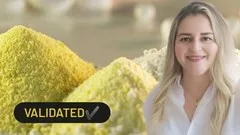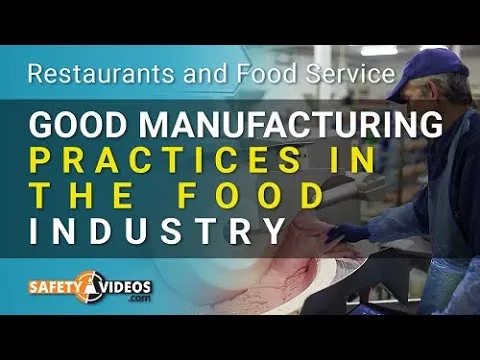
Quality in Pharmaceutical Industry: GMP & Process Validation 
Discover the secrets to ensuring quality in the pharmaceutical industry with the course "Quality in Pharmaceutical Industry: GMP & Process Validation." This comprehensive course covers the basics of process validation, including process design, process qualification, and continued process validation. Learn about general definitions for process validation, process design strategies, and the importance of process qualification. With insights from both the FDA and EMA, this course provides a thorough understanding of process validation in the pharmaceutical industry. Don't miss out on this opportunity to enhance your knowledge and skills in ensuring quality in pharmaceutical manufacturing. Enroll now! ▼
ADVERTISEMENT
Course Feature
![]() Cost:
Cost:
Paid
![]() Provider:
Provider:
Udemy
![]() Certificate:
Certificate:
Paid Certification
![]() Language:
Language:
English
![]() Start Date:
Start Date:
2023-05-11
Course Overview
❗The content presented here is sourced directly from Udemy platform. For comprehensive course details, including enrollment information, simply click on the 'Go to class' link on our website.
Updated in [September 26th, 2023]
What does this course tell?
(Please note that the following overview content is from the original platform)
Process validation is establishing documented evidence which provides a high degree of assurance that a specific process will consistently produce a product meeting its predetermined specifications and quality characteristics. (FDA Definition)The documented evidence that the process, operated within established parameters, can perform effectively and reproducibly to produce a medicinal product meeting its predetermined specifications and quality attributes. (EMA Definition)In this course, basics of process validation are explained within the all details and requirements. Process validation studies are explained in three major section as process design, process qualification and continued process validation.COURSE CONTENT1 INTRODUCTION 2 GENERAL DEFINITIONS FOR PROCESS VALIDATION 2_1 GENERAL DEFINITIONS FOR PROCESS VALIDATION-I 2_1_1 Drug Product (Pharmaceutical Product) 2_1_2 Active Pharmaceutical Ingredient (API) 2_1_3 Inactive Pharmaceutical Ingredient 2_1_4 Starting Materials 2_1_5 Intermediate Product 2_1_6 Packaging Material 2_1_7 Bulk Product 2_1_8 Finished Pharmaceutical Product (FPP) (Drug Product) (Final Product) 2_1_9 Manufacturing Flow Chart 2_2 GENERAL DEFINITIONS FOR PROCESS VALIDATION-II 2_2_1 Production 2_2_2 Packaging 2_2_3 Manufacture (Mnaufacturing) 2_2_4 Manufacturer 2_2_5 Marketing Authorization (Product Licence) (Registration Certificate) 2_2_6 Quality Assurance 2_2_7 Quality Control 2_2_8 In-Process Control 2_3 GENERAL DEFINITIONS FOR PROCESS VALIDATION-III 2_3_1 Standart Operating Procedure (SOP) 2_3_2 Batch (Lot) 2_3_3 Batch Number (Lot Number) 2_3_4 Batch Record 2_3_5 Master Record 2_3_6 Master Formula 2_3_7 Specification 2_3_8 Authorized Person 2_4 GENERAL DEFINITIONS FOR PROCESS VALIDATION-IV 2_4_1 Calibration 2_4_2 Qualification 2_4_3 Types of Qualification 2_4_4 Validation 2_4_5 Types of Validation 2_5 GENERAL DEFINITIONS FOR PROCESS VALIDATION-V 2_5_1 Commercial Manufacturing Process 2_5_2 Process Validation 2_5_3 Process Design 2_5_4 Process Qualification 2_5_5 Continued Process Verification 2_6 GENERAL DEFINITIONS FOR PROCESS VALIDATION-VI 2_6_1 Critical Material Attribute (CMA) 2_6_2 Critical Process Parameter (CPP) 2_6_3 Critical Quality Attribute (CQA) 2_6_4 Quality Target Product Profile (QTPP) 3 PROCESS VALIDATION ACCORDING TO EMA & FDA 4 INTRODUCTION TO PROCESS VALIDATION 4_1 Introduction to Process Validation 4_2 Approach to Process Validation 4_3 Aims of Process Validation 5 GENERAL CONSIDERATION FOR PROCESS VALIDATION 6 PROCESS DESIGN 6_1 Introduction to Process Design 6_2 Building and Capturing Process Knowledge and Understanding 6_3 Establishing a Strategy for Process Control 7 PROCESS QUALIFICATION 7_1 Introduction to Process Qualification 7_2 Design of a Facility and Qualification of Utilities and Equipment 7_3 Process Performance Qualification 7_4 Process Performance Qualification Protocol 7_5 Process Performance Qualification Report 8 CONTINUED PROCESS VERIFICATION 8_1 Continued Process Verification 9 CONCLUSION
We considered the value of this course from many aspects, and finally summarized it for you from two aspects: skills and knowledge, and the people who benefit from it:
(Please note that our content is optimized through artificial intelligence tools and carefully reviewed by our editorial staff.)
What skills and knowledge will you acquire during this course?During this course on Quality in the Pharmaceutical Industry: GMP & Process Validation, the learner will acquire the following skills and knowledge:
1. Understanding the basics of process validation: The course provides a comprehensive explanation of process validation, including its definition and importance in the pharmaceutical industry.
2. Knowledge of process validation studies: The course covers the three major sections of process validation, namely process design, process qualification, and continued process validation. Learners will gain a deep understanding of each section and its requirements.
3. Familiarity with general definitions related to process validation: The course introduces various terms and definitions commonly used in process validation, such as drug product, active pharmaceutical ingredient (API), packaging material, manufacturing flow chart, and more.
4. Understanding the process validation according to EMA and FDA: The course provides insights into the process validation guidelines and requirements set by the European Medicines Agency (EMA) and the U.S. Food and Drug Administration (FDA).
5. Knowledge of process design: Learners will gain an understanding of the process design phase, including the importance of building and capturing process knowledge and establishing a strategy for process control.
6. Understanding process qualification: The course covers the process qualification phase, which involves designing a facility, qualifying utilities and equipment, and conducting process performance qualification. Learners will also learn about the protocols and reports associated with process qualification.
7. Familiarity with continued process verification: The course introduces continued process verification, which ensures that the validated process remains in a state of control. Learners will understand the importance of ongoing monitoring and verification of the process.
By the end of this course, learners will have a comprehensive understanding of process validation in the pharmaceutical industry, including its principles, requirements, and implementation. They will be equipped with the necessary knowledge and skills to ensure the consistent production of high-quality pharmaceutical products.
Who will benefit from this course?
This course on quality in the pharmaceutical industry, specifically focusing on Good Manufacturing Practices (GMP) and process validation, will benefit individuals and professionals working in the following areas:
1. Quality Assurance and Quality Control Professionals: This course provides a comprehensive understanding of process validation, which is a crucial aspect of ensuring product quality and compliance with regulatory requirements. Quality assurance and quality control professionals will gain the necessary knowledge and skills to effectively implement and manage process validation activities.
2. Manufacturing and Production Personnel: Process validation is essential for ensuring that pharmaceutical products are consistently manufactured according to predetermined specifications and quality attributes. Manufacturing and production personnel will benefit from this course by learning about the principles and techniques of process design, qualification, and verification, enabling them to optimize manufacturing processes and ensure product quality.
3. Regulatory Affairs Professionals: Regulatory agencies, such as the FDA and EMA, require pharmaceutical companies to demonstrate process validation as part of the product approval process. Regulatory affairs professionals will benefit from this course by gaining a thorough understanding of the regulatory requirements and guidelines for process validation, enabling them to effectively navigate the regulatory landscape and ensure compliance.
4. Research and Development Scientists: Process validation is closely linked to process development and optimization. Research and development scientists will benefit from this course by understanding the principles and considerations involved in designing robust and scalable manufacturing processes. This knowledge will enable them to develop processes that can be effectively validated and ensure the successful transfer of products from the laboratory to commercial production.
5. Pharmaceutical Industry Professionals: Professionals working in various roles within the pharmaceutical industry, including production managers, quality managers, and technical specialists, will benefit from this course by gaining a comprehensive understanding of process validation. This knowledge will enable them to contribute to the overall quality management system of their organizations and ensure the production of safe and effective pharmaceutical products.
Course Syllabus
INTRODUCTION
GENERAL DEFINITIONS for PROCESS VALIDATION
PROCESS VALIDATION ACCORDING TO EMA & FDA
INTRODUCTION TO PROCESS VALIDATION
GENERAL CONSIDERATION FOR PROCESS VALIDATION
PROCESS DESIGN
PROCESS QUALIFICATION
CONTINUED PROCESS VERIFICATION
CONCLUSION
Course Provider

Provider Udemy's Stats at AZClass
Discussion and Reviews
0.0 (Based on 0 reviews)
Explore Similar Online Courses

Adobe Premiere Pro CC : Essentials Training Course

Into the Forest: Add Depth to Your Illustration with Blender 3D

Python for Informatics: Exploring Information

Social Network Analysis

Introduction to Systematic Review and Meta-Analysis

The Analytics Edge

DCO042 - Python For Informatics

Causal Diagrams: Draw Your Assumptions Before Your Conclusions

Whole genome sequencing of bacterial genomes - tools and applications

Good Manufacturing Practices in the Food Industry Training Video

Good Manufacturing Practices


Start your review of Quality in Pharmaceutical Industry: GMP & Process Validation